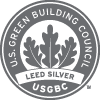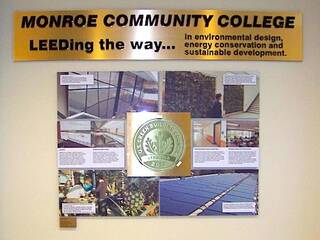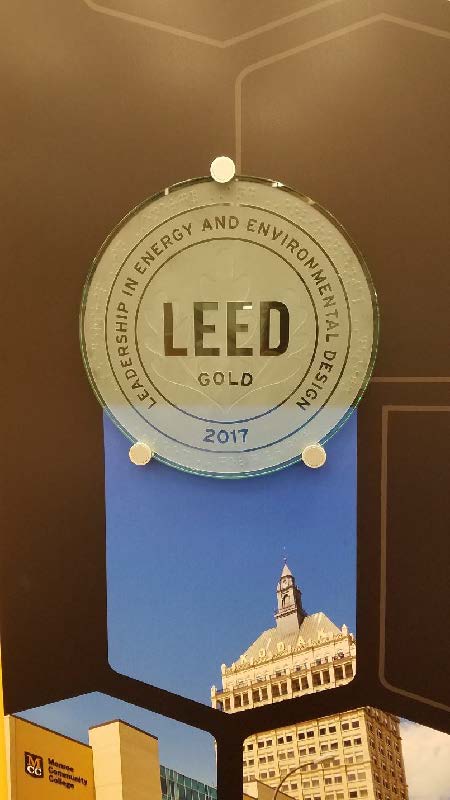LEED
The Leadership in Energy and Environmental Design (LEED) Green Building Rating System is a third-party certification program and the nationally accepted benchmark for the design, construction and operation of high performance green buildings. LEED provides building owners and operators with the tools they need to have an immediate and measurable impact on their buildings’ performance.
‘LEED’ and related logo is a trademark owned by the U.S. Green Building Council and is used by permission.
Three recent major construction projects at MCC have been purposefully designed according to standards of sustainability. For information on these projects, click on either campus below.
Brighton campus LEED projects

- LEED Silver
Wolk Center for Excellence in Nursing
- LEED Gold
PAC Athletic Center

Downtown Campus
LEED Gold Certification
 MCC’s Downtown Campus earned Leadership in Energy and Environmental Design (LEED) Gold certification awarded by the United States Green Building Council (USGBC). Gold represents the second- highest rating and recognizes outstanding commitment to sustainability in building planning, construction and management. To receive a LEED Gold rating, a project must earn 60 points. MCC’s Downtown Campus earned 64 points for a wide array of sustainability features, including green roofs, a double-pane wall of windows along the front of the campus, and responsible construction material use. Eighty percent of all construction waste was diverted from landfills and 15 percent of the materials purchased for the project were manufactured using recycled materials.
MCC’s Downtown Campus earned Leadership in Energy and Environmental Design (LEED) Gold certification awarded by the United States Green Building Council (USGBC). Gold represents the second- highest rating and recognizes outstanding commitment to sustainability in building planning, construction and management. To receive a LEED Gold rating, a project must earn 60 points. MCC’s Downtown Campus earned 64 points for a wide array of sustainability features, including green roofs, a double-pane wall of windows along the front of the campus, and responsible construction material use. Eighty percent of all construction waste was diverted from landfills and 15 percent of the materials purchased for the project were manufactured using recycled materials.
Several sections of the roof have been retrofitted with green roofs, reducing storm water runoff and rooftop solar heat gain. Areas of the roofs without vegetation have been enhanced to minimize the effects of solar heat.
The roof above the event space offers valuable learning opportunities for students. A display, along with other signage noting green and sustainable features, are displayed prominently throughout the building and are used as a teaching and learning tool in science courses.
It is anticipated that the campus will be 23 percent more energy-efficient than required by code, generating a projected annual savings of $117,000 in energy costs. To meet LEED standards, an estimated $680,000 was added to the overall project cost, with a return on investment estimated in just over six years based on annualized energy savings.
LEED Parking Spaces
Contact Information
Brighton Campus
Building 1, Room 308B
Mon thru Fri, 8:45am to 4:45pm
(585) 292-3021

